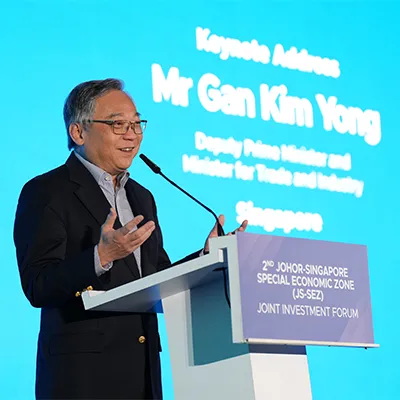The internet economy has been a lever for resilience, opening up new channels and opportunities for enterprises and small businesses to adapt. The bold companies that are moving fast and reinventing themselves with a global outlook are emerging as market leaders of the new normal and engines of economic recovery.
Leaning on technology to move quickly
On the eve of lockdowns across the region, many businesses scrambled to bolster their online channels and logistics capabilities to ensure minimal impact to business operations. Stripe has worked with a diverse range of businesses to help them reinvent their business models online.
Household names like Isetan department store in Singapore and Jaya Grocer in Malaysia that have long been bricks-and-mortar only were able to respond to surges in demand and re-orient towards online services when it mattered most.
The creation of new online sales channels, coupled with months-long restrictions on movement, shifted consumer habits as well. Over the past year, the value of ecommerce in SEA increased by 63 per cent, with over a third of 2020’s online commerce generated by new shoppers.
For the businesses that invested in moving online, the dividends are likely to keep paying off. According to the same research, four fifths of shoppers who shifted online in the past year intend to continue buying online -- even as COVID restrictions ease up in many SEA countries.
Reimagining a new model of shopping
While Robinsons was closing its doors for good this year, sporting goods chain, Decathlon, was opening its fifth experience store in Singapore, on 3,000 square feet of prime real estate on Singapore’s Orchard Road.
Retailers have generally responded to the economic pressures of the pandemic by giving up their expensive leases and focusing instead on building out their online strategy. However, shopping mall culture remains resilient in Southeast Asia and many businesses have actually invested in creating or expanding their physical presence, spinning up new models for offline shopping.
Although SEA shoppers still prefer to see, touch and try before they buy, over the last months, they’ve become accustomed to the ease and speed of buying online and expect the same when making purchases offline. While businesses recognise the importance of meaningful offline experiences to keep customers engaged, they’re also investing in integrating seamlessly with their online platform and offering contactless services where possible.
Some retailers are even experimenting with mobile apps that enable a customer to search and buy online, then simply enter the store and walk out with their product.
At its new experience store, Decathlon encourages customers to scan product QR codes to find out more, and to pay on the app for contactless billing, relying on technology. Customers are also encouraged to order online and have items delivered to them, or choose to pick them up in store. These omnichannel innovations culminate in a shopping experience that reduces friction and makes buying as seamless and customer-oriented as possible.
Globalisation as a channel for recovery
With consumer behaviours, operating environments and market conditions changing constantly, responsiveness and speed are more important than ever. This is where technology platforms come in, acting as enablers for agility, transformation, and speed.
Southeast Asian e-commerce marketplace, Lazada is a great example of this. At the height of the pandemic, the brand announced partnerships with a number of shopping malls, including Marina Square in Singapore, Siam Center in Thailand and malls under the Pakuwon Group in Indonesia, to help them bring their tenants online into mini virtual replicas of the physical malls.
Established retail players often rely on legacy systems that may not be capable of spinning up ecommerce channels quickly. Platforms like Lazada offer a simple solution for them to move their tenants online with speed and agility to reach a global audience.
The COVID pandemic has been a great equaliser in business, with organisations large and small facing similar challenges as well as a concurrent opportunity to reinvent themselves. Survival and success are no longer about size. Instead, economic recovery and future resilience lies in a focus on speed, a willingness to adapt and a global mindset.
The writer is APAC revenue & growth lead at Stripe.
This article was first published on the Singapore Business Times, and is reproduced with the author's permission.








